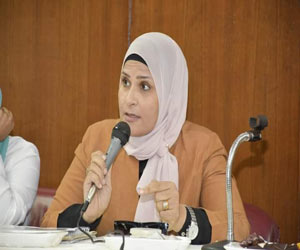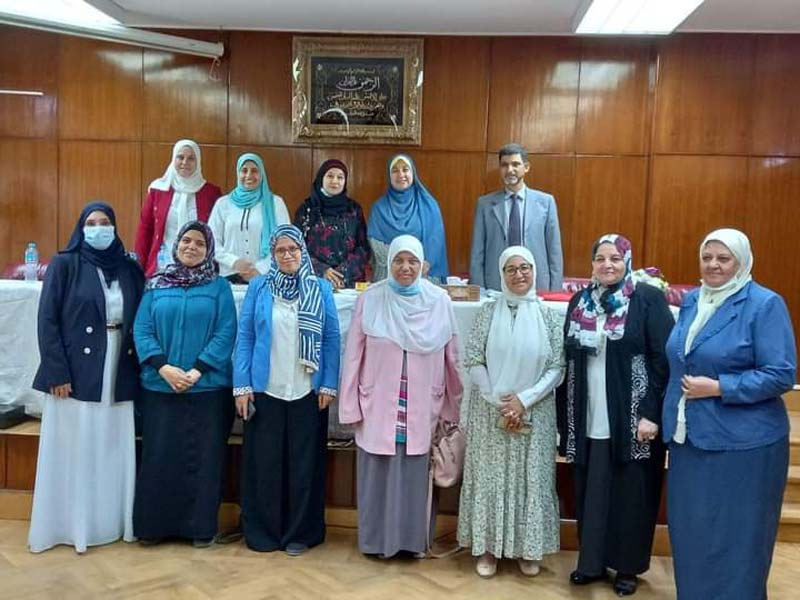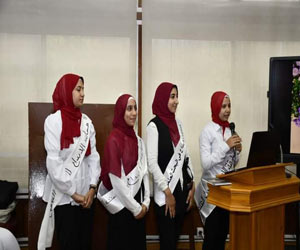Creativity competition … in scientific research at the Faculty of Girls
The activities of the first day of the creativity competition in scientific research for the sixth season in a row began in the presence of Prof. Dr. Amira Youssef, Dean of the Faculty, Prof. Dr. Mai Helmy, Vice Dean for Education and Student Affairs, and the official of the Scientific Committee for Youth Sponsorship, Dr. Sherbet Ahmed Mohamed.
The first day includes the scientific departments, where seven research papers were presented; The first of these is “Quantum Computers” presented by Hager Ali Al-Sayed, supervised by: Dr. Zainab Youssef, the first educational physics in English. The research aims to address the subject of the quantum computer and its method of operation in a nutshell, the foundations on which it depends in its work and the expected future of it.
The second research, entitled: Nutritional, medical and genetic treatment of galactosemia, presented by: Mona Hassan Ali Gomaa, Department of Biochemistry and Nutrition
Third level: The Supervision of Prof. Ass. Dr. Alia Mohamed Salah
 |
 |
 |
||
Galactosemia is a genetic disease that results from the absence of the gene responsible for the production of the hepatic enzyme that digests the sugar lactose, which leads to the accumulation of sugar inside the body, causing a pathological condition that may lead to death, and the development of symptoms can be avoided by eating a diet free of lactose and galactose. Galactosemia with genetically modified stem cells.
The title of the third research is "Climate change and the productivity of some agricultural crops in the valley region", presented by: Nadine Anwar Saad and Nawal Ali Hussein, the third group, supervised by Dr. Basma Shaaban, and this study was conducted to find out the impact of climatic changes represented in temperatures on some agricultural crops such as (wheat - Beans - maize - sugar cane - sugar beet) in the Nile Valley governorates over the past ten years. The results of this study showed that there was a change in temperature and precipitation in those governorates. This study showed a change in temperature and this change was in line with the change in the productivity of some agricultural crops.
Research title: The behavior of a satellite’s trajectory near the equilibrium points of the Sun-Earth system
Presented by: Aya Masoud Hamed Muhammad and Noha Atef Gumaa, Supervision: Dr. Lina Shalaby
the behavior of a satellite’s trajectory near the equilibrium points of the Sun-Earth system is studied. Its motion is circular and described by the restricted three body problem. The equations of motion of the satellite in Sun-Earth system are discussed for their ordinary differential equations form, and the equilibrium points, La-grangian points, are determined. Then, the stability is studied at each Lagrangian point. Finally, the trajectories of a satellite starting its motion near Lagrangian points are illustrated, showing the stability and instability behavior.
Research Title: The Importance of Mathematics in Our Lives, Presented by: Aya Walid Sayed, Supervision: Dr. Mona Trad.
Have you ever thought why we study mathematics and why it is important why we solve equations and why calculus?
Presented by: Israa Wazni Ahmed, Second Division, Supervision: Dr. Haitham Mohammed. Section: Biochemistry and Nutrition.
Research on the use of a diet containing millet grass in controlling the blood sugar level in diabetics has achieved good and promising results. The research shows the importance of using this herb not only for diabetics but also for healthy people. millet.
Preventive and Curative Effects of Platelet-rich plasma and Ginger Extract Against Paracetamol-induced renal toxicity in Rats
Presented by: Manar Muhammad, Asmaa Muhammad Amina Jamal, Amira Sayed, Maha Reda, Yasmine Farraj, Department of Zoology, Department of Chemistry and Zoology, supervision / Dr. Asmaa Za'za
Abstract Objective: The present study aimed to evaluate the protective effect of Plateletrich plasma (PRP) and ginger extract (GE) on oxidative stress, inflammatory markers, apoptotic and ant apoptotic markers in the kidney tissue of the paracetamol treated rats. Methods: Forty male Wistar rats were divided into five groups; Group (1): Negative control group (Con), Group(2): Positive control group orally received paracetamol (PCM) in a single oral dose of 3 gm/kg b. wt., Group(3): PRP and PCM treated group orally administered 3 gm/kg b. wt. of PCM and treated with PRP intraperitoneal by a single dose 50 μL (PCM+PRP), Group (4): GE and PCM treated group orally administered 3 gm/kg b. wt. of PCM and treated with GE 250 mg/kg of BW/day for four weeks (PCM+GE) and Group (5): Rats were injected orally with a single oral dose of paracetamol at 3 gm/kg then treated with both of PRP and GE at the same previous doses.

.svg)



